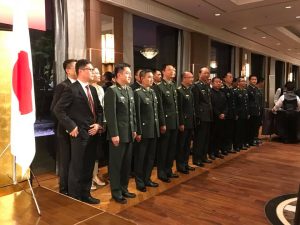A delegation from the Japan Self-Defense Forces (JSDF) will visit China in July, while members of China’s People’s Liberation Army (PLA) will travel to Japan in September, Sasakawa Yohei, honorary chairman of the Sasakawa Peace Foundation, a Japanese non-profit group that has organized the exchange, announced on May 30.
The military exchanges come amid strained bilateral relations over Taiwan and the Senkaku/Diaoyu Islands, which are administered by Japan but claimed by China.
Meeting in Hiroshima, Japan, for their annual summit on May 19-21, leaders from the Group of Seven (G-7) nations took a firmer stance on China’s assertive behavior in the East and South China Seas, with their communique declaring, “We strongly oppose any unilateral attempts to change the status quo by force or coercion.” China staunchly opposed the statement.
When asked about the timing of resumed military exchanges amid rising tensions in East Asia and elsewhere, Sasakawa said, “The situation between governments and the private sector is different. At times like this, it is effective for the private sector to create a window for mutual understanding. It’s very important to hobnob together and have informal conversations. This military exchange is unique even in the world.”
So far, Japan has dispatched 152 JSDF personnel to China on 13 different trips, while China has sent 228 PLA personnel to Japan on 12 trips, according to the program’s organizer. PLA members have deepened exchanges through visits to Japanese companies and farming villages, as well as visits to the Japan Ground Self-Defense Force, the Japan Air Self-Defense Force, and the Japan Maritime Self-Defense Force for about a week each time.
Officer-level bilateral military exchanges began in 2001 but were canceled in 2010 following the arrest of a Chinese trawler captain whose vessel had repeatedly rammed two Japanese Coast Guard vessels off the Senkaku/Diaoyu Islands in the East China Sea.
The two nations resumed the military exchange in October 2011 when 20 PLA officers visited Japan, with JSDF officers reciprocating with a trip to China in February 2012.
But the PLA canceled its military exchange program with the JSDF in 2012, again amid escalating tensions over the Senkaku/Diaoyu Islands following their nationalization by Japan.
However, the Central Military Commission of the Chinese Communist Party agreed to resume the military exchange with the JSDF in February 2018, when Sasakawa visited Beijing.
Due to the COVID-19 pandemic that started at the end of 2019 in China, the program was again interrupted, and the two militaries have been unable to conduct face-to-face exchanges for the past four years.
At the official level of bilateral defense relations, Japanese Defense Minister Hamada Yasukazu and Chinese Defense Minister Gen. Li Shangfu on May 16 held the first call using a dedicated “hotline.” They confirmed that this communication system plays an important role in building confidence between the two countries and avoiding unforeseen circumstances. They will reportedly meet in Singapore on the sidelines of the Shangri-La Dialogue on June 2-4.
China appears to attach great importance to Sino-Japanese exchanges in order to attract the Japanese side as the China-U.S. confrontation intensifies.
On the Japanese side, Prime Minister Kishida Fumio has stressed that Tokyo will build constructive and stable relations with Beijing, which was also mentioned in the G-7 joint statement.

































